“Take away this pudding! It has no theme,” Winston Churchill is said to have exclaimed when confronted with an undistinguished dessert. The Middle East today resembles one of those puddings, but Uncle Sam may not send it back. A themeless pudding is better than a poisoned one. It is hard to overstate how much the Middle East has changed in…
Arab Barometer: MENA Residents Have an Increasingly Favorable View of China
A new survey published by Arab Barometer, a Princeton University-affiliated non-partisan quantitative research institute, reveals increasingly favorable public perceptions of China in many countries throughout the Middle East and North Africa. “In nine of 12 countries surveyed as part of the Arab Barometer’s fifth wave, roughly half or more favor stronger economic relations with China,” said the group’s director, Dr….
Progress and missed opportunities: Morocco enters its third decade under King Mohammed VI
In the midst of the coronavirus pandemic, Morocco’s King Mohammed VI will celebrate 21 years on the throne in July 2020. Over the last two decades, the king has spearheaded positive civil and political reforms, as well as formidable foreign policy and infrastructural changes. Most recently, the regime took swift and effective measures to control the initial spread of the…
Arab Barometer : 49% des Marocains favorables à plus d’investissements chinois
Publiés vendredi dernier, les résultats du sondage mené par Arab Barometer, un réseau de recherche basé à l’Université de Princeton, aux EtatsUnis, sur le niveau d’influence de la Chine révèlent que de nombreux pays ont connu une augmentation spectaculaire de l’engagement chinois. « Plus récemment, la Chine a considérablement et visiblement augmenté son aide à un certain nombre de pays de la région…
The Lebanese Government is right about mandatory (military) service
The Lebanese Minister of Defense has recently announced plans to reinstate mandatory military service 13 years after its abolition in 2007. More details are expected to follow in the coming few weeks. Once considered essential to bring together a deeply torn society after 15 years of civil war, mandatory service, also known as conscription or flag service, consisted of one…
What lies ahead as Jordan faces the fallout of COVID-19
On June 28, Jordan’s Health Minister, Dr. Saad Jaber, boldly declared that the coronavirus had “dried up and died in Jordan.” Dr. Jaber backtracked days later by renewing calls to adhere to necessary safety measures. Amid fears of a second wave, the Hashemite Kingdom of Jordan continues to stand out among its neighbors, as it exhibits an impressively low rate…
Why are most Arabs so prepared to trust the military?
Do people in the Arab region tend to trust transparent and corruption-free institutions more than others? That is what you would expect, but the opposite appears to be the case. According to the Arab Barometer from 2018-2019, 49.4% of people in Algeria, Iraq, Palestine, Jordan, Tunisia, Morocco, Kuwait, Sudan, Lebanon, Egypt and Yemen put a huge amount of trust in their…
Arab governments denounce Israel’s plans to annex the West Bank, warning it will imperil regional security and peace building.But will Israel listen?
….”Israel enjoys a less hostile Arab world, a friendlier Arab world and an Arab world that seeks Israel’s help with broader geostrategic interests in the region” said Amaney Jamal, a Princeton professor and co-founder of the Arab Barometer, which gauges public opinion in the Middle East…
Using internet surveys in the MENA region during COVID-19: Will all voices be heard?
In the Middle East and North Africa (MENA), the coronavirus (COVID-19) is disproportionately affecting poor households, who are more likely to live in cramped conditions, often with elderly relatives, and to depend on informal sector jobs with no health insurance. Yet these households are the least likely to be heard through surveys, which increasingly use the internet for data collection….
